Fleurs du Mal Magazine


Or see the index
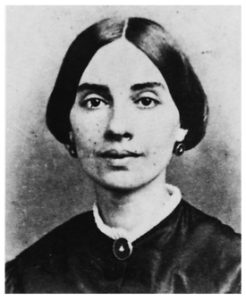
We talked as Girls do
We talked as Girls do –
Fond, and late –
We speculated fair, on every subject, but the Grave –
Of ours, none affair –
We handled Destinies, as cool –
As we – Disposers – be –
And God, a Quiet Party
to our authority –
But fondest, dwelt upon Ourself
As we eventual – be –
When Girls, to Women, softly raised
We – occupy – Degree –
We parted with a contract
To cherish, and to write
But Heaven made both, impossible
Before another night.
Emily Dickinson
(1830-1886)
We talked as Girls do
• fleursdumal.nl magazine
More in: Archive C-D, Archive C-D, Dickinson, Emily
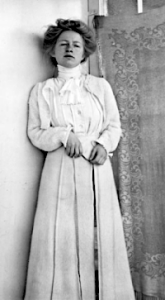
Skönhet
Vad är skönhet? Fråga alla själar –
skönhet är varje överflöd, varje glöd, varje överfyllnad och varje stort armod;
skönhet är att vara sommaren trogen och naken intill hösten;
skönhet är papegojans fjäderskrud eller solnedgången som bebådar storm;
skönhet är ett skarpt drag och ett eget tonfall: det är jag,
skönhet är en stor förlust och ett tigande sorgetåg,
skönhet är solfjäderns lätta slag som väcker ödets fläkt;
skönhet är att vara vällustig som rosen eller att förlåta allting för att solen skiner;
skönhet är korset munken valt eller pärlbandet damen får av sin älskare,
skönhet är icke den tunna såsen i vilken diktare servera sig själva,
skönhet är att föra krig och söka lycka,
skönhet är att tjäna högre makter.
Edith Södergran
(1892-1923)
Skönhet
• fleursdumal.nl magazine
More in: Archive S-T, Archive S-T, Södergran, Edith
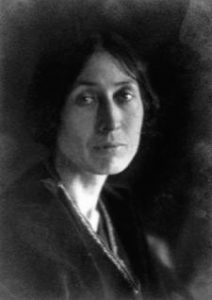
The Everlasting Return
It is dark… so dark, I remember the sun on Chios…
It is still… so still, I hear the beat of our paddles on the Aegean…
Ten times we had watched the moon
Rise like a thin white virgin out of the waters
And round into a full maternity…
For thrice ten moons we had touched no flesh
Save the man flesh on either hand
That was black and bitter and salt and scaled by the sea.
The Athenian boy sat on my left…
His hair was yellow as corn steeped in wine…
And on my right was Phildar the Carthaginian,
Grinning Phildar
With his mouth pulled taut as by reins from his black gapped teeth.
Many a whip had coiled about him
And his shoulders were rutted deep as wet ground under chariot wheels,
And his skin was red and tough as a bull’s hide cured in the sun.
He did not sing like the other slaves,
But when a big wind came up he screamed with it.
And always he looked out to sea,
Save when he tore at his fish ends
Or spat across me at the Greek boy, whose mouth was red and apart like an opened fruit.
We had rowed from dawn and the green galley hard at our stern.
She was green and squat and skulked close to the sea.
All day the tish of their paddles had tickled our ears,
And when night came on
And little naked stars dabbled in the water
And half the crouching moon
Slid over the silver belly of the sea thick-scaled with light,
We heard them singing at their oars…
We who had no breath for song.
There was no sound in our boat
Save the clingle of wrist chains
And the sobbing of the young Greek.
I cursed him that his hair blew in my mouth, tasting salt of the sea…
I cursed him that his oar kept ill time…
When he looked at me I cursed him again,
That his eyes were soft as a woman’s.
How long… since their last shell gouged our batteries?
How long… since we rose at aim with a sleuth moon astern?
(It was the damned green moon that nosed us out…
The moon that flushed our periscope till it shone like a silver flame…)
They loosed each man’s right hand
As the galley spent on our decks…
And amazed and bloodied we reared half up
And fought askew with the left hand shackled…
But a zigzag fire leapt in our sockets
And knotted our thews like string…
Our thews grown stiff as a crooked spine that would not straighten…
How long… since our gauges fell
And the sea shoved us under?
It is dark… so dark…
Darkness presses hairy-hot
Where three make crowded company…
And the rank steel smells….
It is still… so still…
I seem to hear the wind
On the dimpled face of the water fathoms above…
It was still… so still… we three that were left alive
Stared in each other’s faces…
But three make bitter company at one man’s bread…
And our hate grew sharp and bright as the moon’s edge in the water.
One grinned with his mouth awry from the long gapped teeth…
And one shivered and whined like a gull as the waves pawed us over…
But one struck with his hate in his hand…
After that I remember
Only the dead men’s oars that flapped in the sea…
The dead men’s oars that rattled and clicked like idiots’ tongues.
It is still… so still, with the jargon of engines quiet.
We three awaiting the crunch of the sea
Reach our hands in the dark and touch each other’s faces…
We three sheathing hate in our hearts…
But when hate shall have made its circuit,
Our bones will be loving company
Here in the sea’s den…
And one whimpers and cries on his God
And one sits sullenly
But both draw away from me…
For I am the pyre their memories burn on…
Like black flames leaping
Our fiery gestures light the walled-in darkness of the sea…
The sea that kneels above us…
And makes no sign.
Lola Ridge
(1873-1941)
The Everlasting Return
• fleursdumal.nl magazine
More in: Archive Q-R, Archive Q-R, Ridge, Lola

The Ragged Wood
O hurry where by water among the trees
The delicate-stepping stag and his lady sigh,
When they have but looked upon their images –
Would none had ever loved but you and I!
Or have you heard that sliding silver-shoed
Pale silver-proud queen-woman of the sky,
When the sun looked out of his golden hood? –
O that none ever loved but you and I!
O hurry to the ragged wood, for there
I will drive all those lovers out and cry –
O my share of the world, O yellow hair!
No one has ever loved but you and I.
William Butler Yeats
(1865-1939)
The Ragged Wood
• fleursdumal.nl magazine
More in: Archive Y-Z, Archive Y-Z, Yeats, William Butler
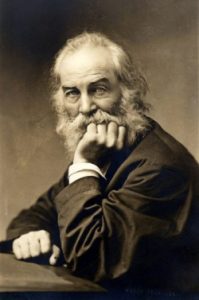
A Noiseless Patient Spider
A noiseless patient spider,
I mark’d where on a little promontory it stood isolated,
Mark’d how to explore the vacant vast surrounding,
It launch’d forth filament, filament, filament, out of itself,
Ever unreeling them, ever tirelessly speeding them.
And you O my soul where you stand,
Surrounded, detached, in measureless oceans of space,
Ceaselessly musing, venturing, throwing, seeking the spheres to connect them,
Till the bridge you will need be form’d, till the ductile anchor hold,
Till the gossamer thread you fling catch somewhere, O my soul.
Walt Whitman
(1819 – 1892)
A Noiseless Patient Spider
• fleursdumal.nl magazine
More in: Archive W-X, Archive W-X, Whitman, Walt

Nachtbild
Heil dem Lebend’gen, der mit voller Hand
Sich zu den Armen und Verlassenen wendet,
Der seinen Trost aus kühlen Bronnen spendet.
Heil dem Propheten in der Sonne Brand!
Dranmor.
Nacht bedeckt den kleinen Friedhof.
In dem dumpfen Leichenhause
Flackert zitternd einer Lampe
Rothe Flamme. – Heiser knarren
Jene Thüren, die das Leben
Sorgsam von dem Tode trennen.
Meine Hand hat sichern Druckes
Sie geöffnet; wie im Schlafe
Aber wandelnd, dacht’ ich nimmer,
Sie zu schließen. –
Leise, wie mit Geisterstimmen
Klagt der Wind dort in den Weiden,
Pochet zürnend an die Fenster,
Flüstert mit den kranken Blumen,
Die aus der Verwesung sprießen,
Treibet mit den Wetterhähnen
Auf dem Thurm sein ächzend Spiel,
Flieget wimmernd um das Häuschen,
Daß die Fenster ängstlich klirren
Und die Flamme furchsam zuckt …
Jener bangen rothen Flamme
Schwankend Leuchten schien ein Winken,
Dem ich folgte, traumbefangen,
Und nun steh’ ich in dem engen
Schaurig-öden, kahlen Stübchen, –
Ich allein bei einem Todten.
––––––––––––––––––––
Auf zwei Schragen und zwei Brettern
Ruht der Todte, alt und häßlich,
Nur in Lumpen eingehüllet;
Ihm zu Haupte brennt die Lampe,
Deren zuckend rothe Lichter
Öfter wie ein Lächeln gleiten
Über die erstarrten Züge
Des verkommenen Gesellen.
Eine harmlos gläub’ge Hand
Suchte seine wildgeballten,
Nun im Tod gekrampften Hände
Fromm zu falten, wie bei Jenen,
Deren Leben schloß ein Beten. –
Auf zwei Schragen und zwei Brettern
Ruht der Todte, still und einsam,
Schläft den letzten, traumlos, leeren,
Ewigen Schlaf…..
Noch am Morgen jagten Bosheit,
Breit Behagen – dem das Elend
Unverständlich – Rohheit, Kaltsinn
Ruhlos ihn von Thür zu Thüre,
Und des Abends wankte jener
Unglücksel’ge, wie betrunken,
Durch die Straßen. Hunger weinte
Aus den kranken, trock’nen Augen,
Aber Trotz zuckt um die Lippen,
Als die Buben, die ihm folgten,
Näher trabten, um das Unthier
Zu beschauen, das man eben
Auf Befehl der weisen, milden
Obrigkeit von dannen hetzet.
Vagabund! so klingt es lachend
Aus dem Munde wilder Kinder;
Vagabund! so klingt es höhnend
Aus dem Mund der klugen Alten;
Vagabund! schreit roh der Büttel;
Vagabund! so ächzt er selber,
Weitertaumelnd. – – –
An der Straße, bei der Grenze
Todesmüde sinkt er nieder.
Fern verklinget das Gejohle
Jener tugendsamen Meute,
Die ihn hetzte und befriedigt
Von dem Schauspiel heim jetzt kehret
Zu dem Herde. –
Dunkel senket schon die Nacht sich
Nieder auf die stille Erde,
Und es senket auch die Nacht sich
Nieder auf die dunkle Seele
Des Gehetzten, des Verfluchten;
Über seinem armen Antlitz,
Grau, wie Spinngeweb’ gebreitet,
Liegen Elend und Verzweiflung.
Stumm umklammert er den Grenzstein
Und starrt finster nach dem einz’gen
Trüben Sterne, der herabschaut,
Auf sein Elend. –
Und es lösen von dem Steine
Los sich seine feuchten Hände
Und sie zucken, zittern, haschen
Nach den dunklen Nebelschatten.
Wild empor sind sie gerichtet,
Eine stumme, fürchterliche,
Himmelstürmend, crasse Drohung,
Wild empor noch schreit der Augen
Gottverneinend herbe Klage.
Aber plötzlich sinken nieder
Seine Arme; es verlöschen
Seiner Blicke letzte Blitze.
Von dem schwarzen Himmel knisternd
Fällt der einz’ge Stern hernieder,
Und ein Windstoß, zaust die Haare
Einer Leiche …..
–––––––––––––––––
War es wie bei jenen Geiern,
Die da wittern, wo das Aas liegt,
Das sie nährt sammt ihren Jungen?
War es des Geschäftes Eifer,
Der ihn trieb, Dich aufzusuchen?
Denn es fand Dich, der berufen,
Sich zu nähren von den Todten,
An dem Grenzstein fand Dich, einsam,
Kalt und todt der – Todtengräber.
Mit den rauhen, derben Händen
Trug er selbst Dich in das Stübchen,
Das bestimmt ist für die Leichen
Jener, die am Wege sterben;
Für die Gott- und Weltverlass’nen
Ist dies Stübchen, ist der Schragen. –
Morgen aber scharret ein Dich,
Dort im letzten Friedhofwinkel,
Einsam, wie er Dich gefunden,
Für gar kargen Lohn der Alte,
Er allein kann Dich verwerthen:
Tod ist Brot ihm! –
Und doch trug auf seinen Händen
Dich ein Mensch zum Ort des Friedens,
Und es schlug ein Menschenherz
Einmal doch an Deinem Herzen…..
Schaurig Mitleid: Dich verspottend
Noch im Tode, giebt er Dir nun,
Was im Leben Dir wohl nimmer
Ist geworden: Licht und Ruhe
Dach und Hände, die Dich nimmer
Von sich stoßen! ….
–––––––––––––––––––
Nacht bedeckt den kleinen Friedhof,
In dem dumpfen Leichenhause
Flackert ängstlich knisternd, zuckend,
Jener Lampe rothe Flamme,
Deren Schwanken mir ein Winken,
Dem ich folgte traumbefangen –
Und noch steh’ ich in dem engen
Schaurig-öden, kahlen Stübchen, –
Ich alleine bei dem Todten!
Ada Christen
(1839 – 1901)
Nachtbild
1878
• fleursdumal.nl magazine
More in: Archive C-D, Archive C-D, Christen, Ada
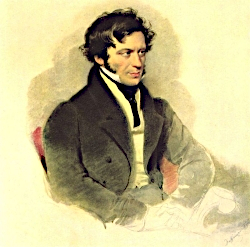
Nichts
Zwischen nichts wissen und Nichts wissen –
In diese zwei Teile ist die Menschheit zerrissen.
Aber Nichts wissen
Ist fruchtlos bis zum Tode beflissen,
Indeß nichts wissen
Ein gottgefälliges Ruhekissen.
Franz Seraphicus Grillparzer
(Wien 1791 – 1872)
Nichts
• fleursdumal.nl magazine
More in: # Classic Poetry Archive, Archive G-H, Archive G-H, Grillparzer, Franz
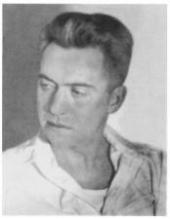
Praise for an Urn
[In Memoriam: Ernest Nelson]
It was a kind and northern face
That mingled in such exile guise
The everlasting eyes of Pierrot
And, of Gargantua, the laughter.
His thoughts, delivered to me
From the white coverlet and pillow,
I see now, were inheritances–
Delicate riders of the storm.
The slant moon on the slanting hill
Once moved us toward presentiments
Of what the dead keep, living still,
And such assessments of the soul
As, perched in the crematory lobby,
The insistent clock commented on,
Touching as well upon our praise
Of glories proper to the time.
Still, having in mind gold hair,
I cannot see that broken brow
And miss the dry sound of bees
Stretching across a lucid space.
Scatter these well-meant idioms
Into the smoky spring that fills
The suburbs, where they will be lost.
They are no trophies of the sun.
Hart Crane
(1889 – 1932)
Praise for an Urn
• fleursdumal.nl magazine
More in: Archive C-D, Archive C-D, Crane, Hart

To A Western Boy
O boy of the West!
To you many things to absorb, I teach,
to help you become eleve of mine:
Yet if blood like mine circle not in your veins;
If you be not silently selected by lovers,
and do not silently select lovers,
Of what use is it that you seek to become eleve of mine?
Walt Whitman
(1819 – 1892)
To A Western Boy
• fleursdumal.nl magazine
More in: Archive W-X, Archive W-X, Whitman, Walt
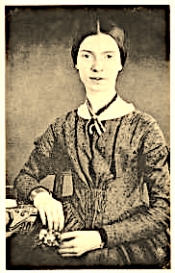
This is my letter to the world
This is my letter to the world,
That never wrote to me, —
The simple news that Nature told,
With tender majesty.
Her message is committed
To hands I cannot see;
For love of her, sweet countrymen,
Judge tenderly of me!
Emily Dickinson
(1830-1886)
This is my letter to the world
• fleursdumal.nl magazine
More in: Archive C-D, Archive C-D, Dickinson, Emily

Jag
Jag är främmande i detta land,
som ligger djupt under det tryckande havet,
solen blickar in med ringlande strålar
och luften flyter mellan mina händer.
Man sade mig att jag är född i fångenskap –
här är intet ansikte som vore mig bekant.
Var jag en sten, den man kastat hit på bottnen?
Var jag en frukt, som var för tung för sin gren?
Här ligger jag på lur vid det susande trädets fot,
hur skall jag komma upp för de hala stammarna?
Däruppe mötas de raglande kronorna,
där vill jag sitta och speja ut
efter röken ur mitt hemlands skorstenar…
Edith Södergran
(1892-1923)
Jag
• fleursdumal.nl magazine
More in: Archive S-T, Archive S-T, Södergran, Edith

On a Political Prisoner
She that but little patience knew,
From childhood on, had now so much
A grey gull lost its fear and flew
Down to her cell and there alit,
And there endured her fingers’ touch
And from her fingers ate its bit.
Did she in touching that lone wing
Recall the years before her mind
Became a bitter, an abstract thing,
Her thought some popular enmity:
Blind and leader of the blind
Drinking the foul ditch where they lie?
When long ago I saw her ride
Under Ben Bulben to the meet,
The beauty of her country-side
With all youth’s lonely wildness stirred,
She seemed to have grown clean and sweet
Like any rock-bred, sea-borne bird:
Sea-borne, or balanced in the air
When first it sprang out of the nest
Upon some lofty rock to stare
Upon the cloudy canopy,
While under its storm-beaten breast
Cried out the hollows of the sea.
William Butler Yeats
(1865-1939)
On a Political Prisoner
Photo: Alice Boughton, 1903
•fleursdumal.nl magazine
More in: Archive Y-Z, Archive Y-Z, Yeats, William Butler
Thank you for reading Fleurs du Mal - magazine for art & literature